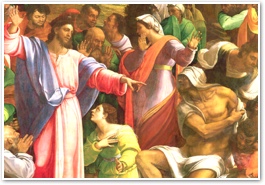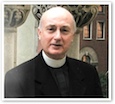From decay to incorruptibility
- FATHER GEORGE RUTLER
"Things look quite different when viewed from a horizontal perspective."
 The schedule for putting together a parish bulletin requires that I write this before Election Day. But as in all decisive moments, the words of Winston Churchill after the Battle of Egypt in 1942 have generic application: "Now this is not the end. It is not even the beginning of the end. But it is, perhaps, the end of the beginning."
The schedule for putting together a parish bulletin requires that I write this before Election Day. But as in all decisive moments, the words of Winston Churchill after the Battle of Egypt in 1942 have generic application: "Now this is not the end. It is not even the beginning of the end. But it is, perhaps, the end of the beginning."
The same may be said of each important decision in anyone's life. Churchill spoke on a day in November when all was autumnal, and a curious thing about that season is its tone of wistfulness despite the riotous colors of its foliage. That is not contradictory, for the mind knows that the colors soon will fade and lie brown on the ground. It is of course a metaphor for human mortality. Yet any melancholy vanishes with the voice of Christ ". . . unless a grain of wheat falls into the earth and dies, it remains alone; but if it dies, it bears much fruit." After Saint Paul heard that voice, he became its descant: ". . . that which you yourself sow is not made alive unless it dies" (1 Corinthians 15:36).
There was an agnostic scholar, somewhat like the Sadducees who did not believe in any resurrection of the body, whose impression of things eternal altered as he lay in his final illness: "Things look quite different when viewed from a horizontal perspective." It would be of civic and personal help if we made all our decisions from that perspective: "Sub specie aeternitatis . . . From the standpoint of eternity." That can be taken in various ways and one of the first to use the expression, Spinoza, was thought by some to be a pantheist if not an atheist. But it certainly means seeing the big picture, viewing circumstances in relation to universal consequences.
The phenomenon of many in the current "Millennial" generation being hesitant to make decisions and commitments could well be rooted in their ignorance of any big perspective, wandering without a goal. Thus the aphorism: "If you don't know where you are going, any road will get you there." Saint Augustine was a bit like that until he met Saint Ambrose in Milan and was taught: "You must always be journeying: from decay to incorruptibility, from mortality to immortality, from turbulence to peace."
These November days are special times to pray for the Holy Souls, remembering lines from John Henry Newman's "The Second Spring," preached ninety years before Churchill spoke of the end of the beginning: "We mourn over the blossoms of May, because they are to wither; but we know, withal, that May is one day to have its revenge upon November, by the revolution of that solemn circle which never stops — which teaches us in our height of hope, ever to be sober, and in our depth of desolation, never to despair."
 This is Meaghen Gonzalez, Editor of CERC. I hope you appreciated this piece. We curate these articles especially for believers like you.
This is Meaghen Gonzalez, Editor of CERC. I hope you appreciated this piece. We curate these articles especially for believers like you.
Please show your appreciation by making a $3 donation. CERC is entirely reader supported.

Acknowledgement
 Father George W. Rutler. "From decay to incorruptibility." From the Pastor (November 13, 2016).
Father George W. Rutler. "From decay to incorruptibility." From the Pastor (November 13, 2016).
Reprinted with permission from Father George W. Rutler.
The Author
 Father George W. Rutler is the pastor of St. Michael's church in New York City. He has written many books, including: The Wit and Wisdom of Father George Rutler, The Stories of Hymns, Hints of Heaven: The Parables of Christ and What They Mean for You, Principalities and Powers: Spiritual Combat 1942-1943, Cloud of Witnesses — Dead People I Knew When They Were Alive, Coincidentally: Unserious Reflections on Trivial Connections, A Crisis of Saints: Essays on People and Principles, Brightest and Best, and Adam Danced: The Cross and the Seven Deadly Sins.
Father George W. Rutler is the pastor of St. Michael's church in New York City. He has written many books, including: The Wit and Wisdom of Father George Rutler, The Stories of Hymns, Hints of Heaven: The Parables of Christ and What They Mean for You, Principalities and Powers: Spiritual Combat 1942-1943, Cloud of Witnesses — Dead People I Knew When They Were Alive, Coincidentally: Unserious Reflections on Trivial Connections, A Crisis of Saints: Essays on People and Principles, Brightest and Best, and Adam Danced: The Cross and the Seven Deadly Sins.


